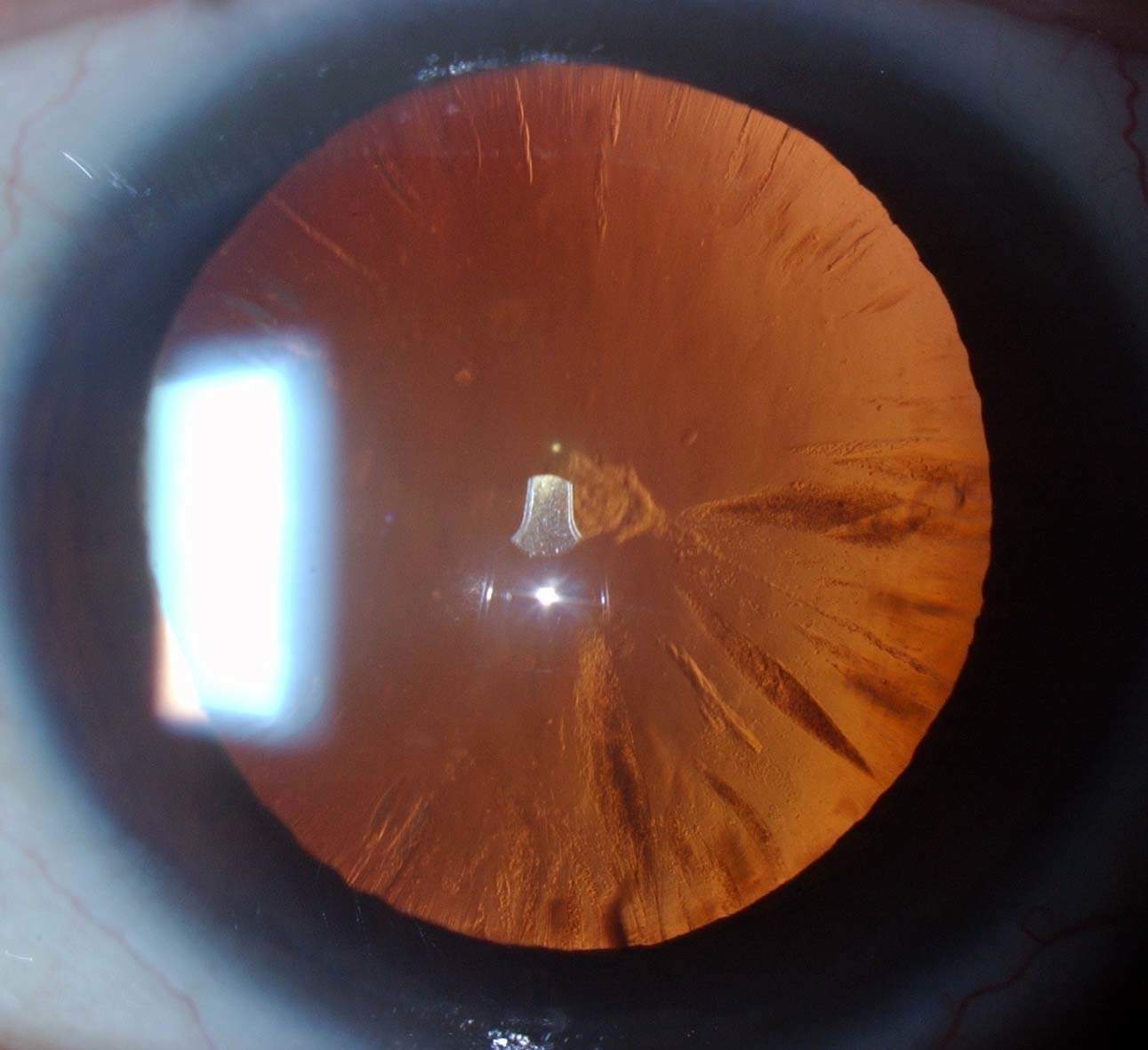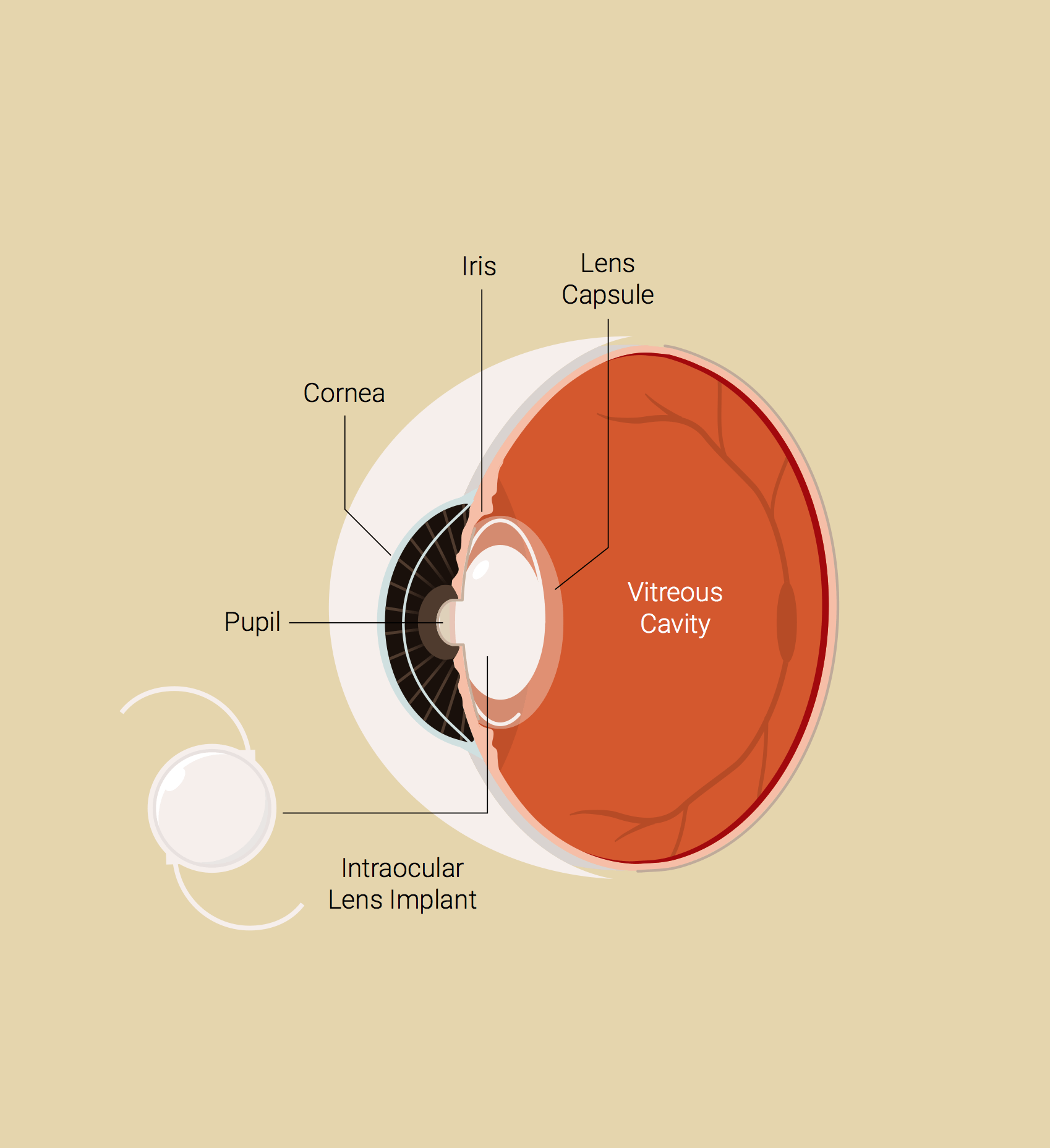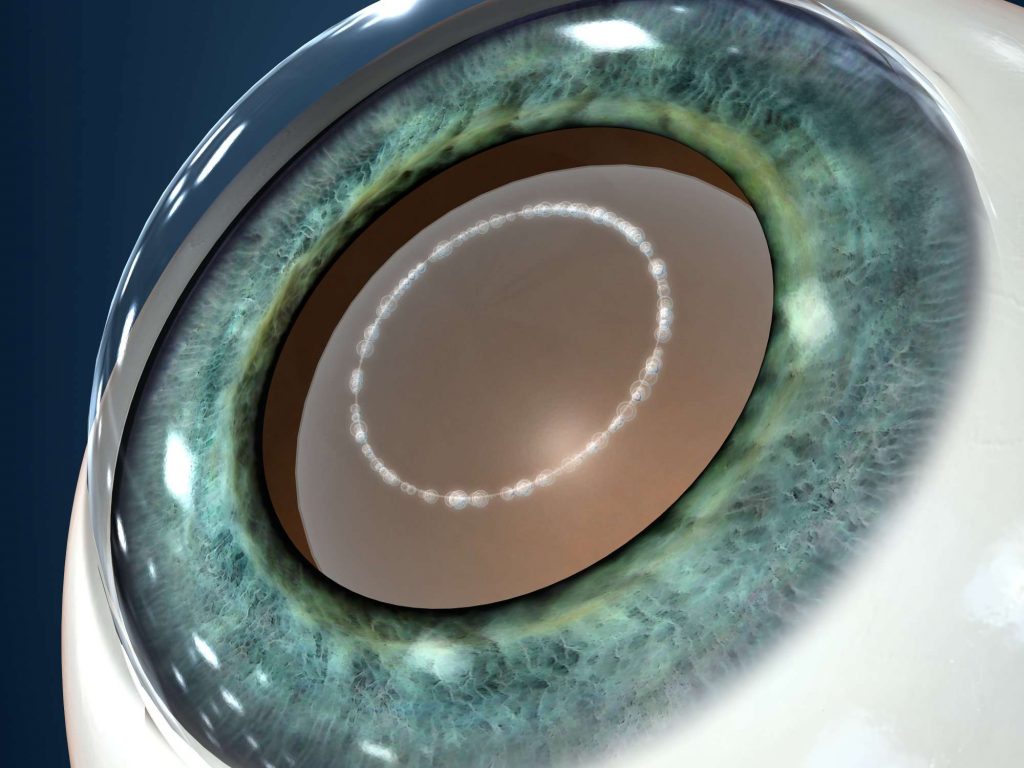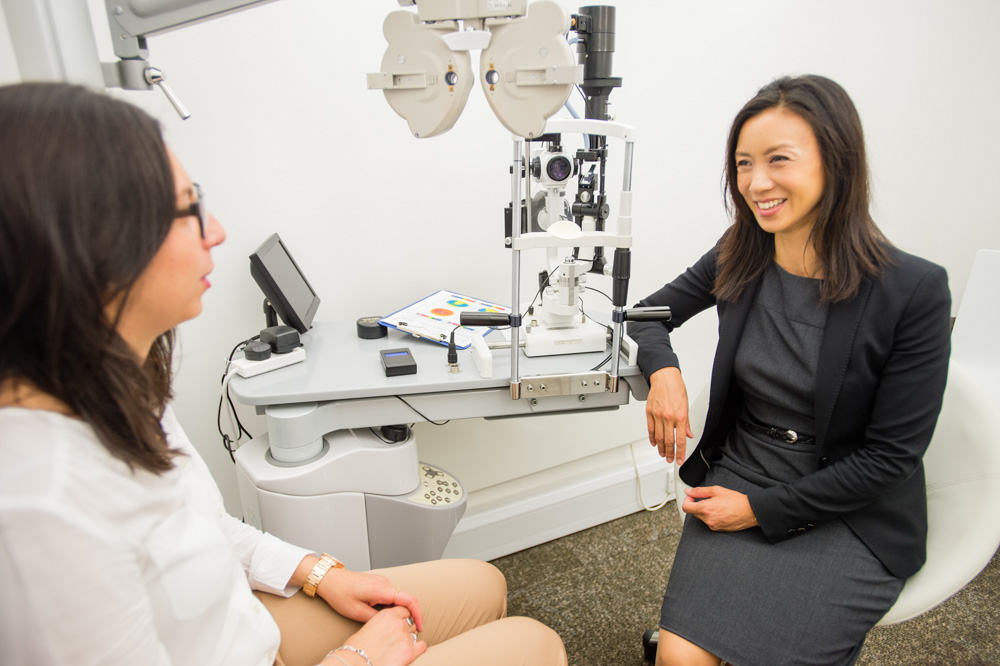Cataract Surgery
What is a cataract?
Cataract is clouding of the natural lens inside the eye, most commonly due to a natural process of ageing of the eye.
What are the symptoms of cataract?
Cataract causes symptoms of blurred vision or a film in the vision, and changes in your glasses prescription. Difficulty reading when light is dim, or uncomfortable glare when lights are very bright can be symptoms of cataract. Colours may be less bright and contrast is frequently reduced.
When is cataract surgery necessary?
When cataracts are causing difficulty with your day to day activities and/or the optometrist cannot correct these symptoms with new glasses, then surgery to correct this is indicated.


How do I know if I am suitable for cataract surgery?
Attending a consultation with Ms Saw and her team, where a comprehensive series of eye tests and evaluations are carried out, is the best way to establish whether cataract surgery is appropriate for you. Ms Saw will then be able to advise you regarding the benefits and risks of cataract surgery in your case, and your options to minimize dependence on spectacles with sophisticated lens implants.
Do cataracts have to be a certain level of maturity before they can be operated on?
Modern cataract surgery is carried out through a tiny keyhole, and can be performed at an early stage, when there is very little cataract. When cataract surgery is carried out with no cataract present, it is termed Refractive Lens Exchange (RLE). Older techniques of large-incision cataract surgery required the lens to mature and harden before surgery was recommended. Waiting for cataract surgery does not harm the health of the eye.
What happens during cataract surgery?
Cataract surgery is a day case procedure carried out under local anaesthetic. During cataract surgery a circular hole in the lens capsule is created, the central lens material is liquefied by high frequency ultrasound and removed with a tiny water vacuum, then a flexible intraocular lens implant is injected into the natural lens capsule. The treatment is quick and can greatly improve vision.
A wonderful advantage of cataract surgery is the ability to correct the eye prescription at the time of surgery, by selecting the strength and type of artificial lens implant to reduce dependence on glasses or contact lenses.
Various types of artificial lens implants are available:
(1) A monofocal implant, which has a single focus and gives crisp, excellent quality vision.
(2) A multifocal implant which has both a distance and reading focus in one implant. These implants give the greatest freedom from glasses.
(3) If your eye has astigmatism, a toric implant may be required.
When cataract surgery is carried out primarily to correct a person’s dependence on glasses or contact lenses, it is known as Refractive Lens Exchange (RLE). RLE is an effective vision correcting treatment for patients in the reading glasses age group, who have a short or long sight prescription which is too high for laser eye surgery, or for those with severe dry eyes or corneas too thin for laser surgery.
Cataract surgery and Refractive Lens Exchange are identical procedures.
What is Laser Cataract Surgery?
Laser cataract surgery is the most advanced form of cataract surgery using a femtosecond laser and 3D imaging technology, which gives unprecedented precision and accuracy to cataract surgery, making it safer and more predictable, and tailored to each individual eye shape.
Combined with sophisticated multifocal lens implants, patients can look forward to the best possible vision after cataract removal or RLE surgery.


Why Private Cataract Surgery with Miss Saw?
Private cataract surgery with Miss Sawensures that your surgery is performed by Miss Saw and you see her at each and every consultation, giving you reassurance that your eyes are in experienced hands with the best possible outcome.
Miss Saw sees you at a consultation before the surgery, to thoroughly examine your eyes and go through the results of your eye measurements and other tests. She will then advise you on the treatment which is most appropriate for you.
Private cataract surgery with Miss Saw also gives you greater choice, being able to have the latest Femtosecond Laser technology for superb precision during the surgery, as well as the option of having a multifocal lens implant to correct dependence on reading glasses, or a toric lens implant to eliminate any astigmatism.
Miss Saw is a Consultant Ophthalmic Surgeon and has carried out thousands of cataract/RLE procedures. Consistently outstanding patient testimonials reflect her unparalleled standards of excellence and care.
What will happen during my consultation appointment?
During the consultation Miss Saw and her team will perform several diagnostic tests including:
- A careful glasses test (refraction), evaluation of ocular dominance, binocular fusion and eye muscle control.
- Detailed scans and measurements of the eye, using state-of-the-art equipment that will detect astigmatism in the cornea which requires a toric intraocular implant, and will be used to select the intraocular lens implant power most appropriate for your eye.
- Miss Saw will do a comprehensive examination of your eyes, including an eye pressure check, examination of the back of your eye (the retina) and evaluation of the health of the surface of your eyes.
Miss Saw will explain the results of the eye tests and her examination findings to you. She will then discuss the options for sight correction which are most appropriate for your eyes. Miss Saw will perform all the surgical procedures.
Do I need to prepare for the consultation?
- If you wear contact lenses, please remember to leave your contact lenses out before the consultation, for the following durations:
- Daily disposable soft lenses – at least 3 days
- Weekly/fortnightly/monthly soft lenses – at least 7 days
- Gas permeable lenses – at least 2 weeks
- Hard lenses – 4 weeks (or change to daily disposables, wear them for 3 weeks & leave them out for 1 week prior to the appointment)
Continuous contact lens wear can lead to temporary changes in the shape of your cornea, so it is important to leave contact lenses out prior to the consultation to ensure that the eye tests we perform are accurate. After the consultation, soft contact lenses can be used again, but they should be stopped 1-2 days prior to laser eye surgery. Hard contact lenses must be stopped 2 weeks before laser eye surgery. For RLE/cataract or ICL surgery, all types of lenses can be used until the day of the surgery.
- Bring a record of all your spectacle prescriptions over the last 2 years if possible. Laser eye surgery is normally postponed until the spectacle prescription is stable. Small variations in your prescription are normal, but if there has been a significant change over the last 2 years, we would normally wait 12 months before proceeding with surgery to ensure that there is no progressive change. Learn more about understanding your prescription
- You should allow a full two hours for your consultation.
- Your pupils will be dilated at the initial consultation. This will make your vision blurry and your eyes sensitive to bright light for a few hours. Bring sunglasses and avoid driving or biking to your appointment.
- Read the literature we send you and bring any questions you may have, to your consultation with Valerie.
How long does cataract surgery take?
The cataract surgery itself takes 20 minutes or so. If you have femtosecond laser surgery it will take a little longer, 40 minutes or so. You will be at the day surgery facility for approximately 1-2 hours, to prepare the eye for surgery and to care for it after surgery including dispensing your postoperative eye drops.
How much time should I plan off work for cataract surgery?
Although the visual recovery after cataract surgery is rapid: you can expect to see quite well within 1-2 days of surgery. Provided you are able to put drops in 4x per day, a return to work a few days after surgery will not damage the eye. Dusty environments are unlikely to damage the eye, but may be irritating, and should be avoided for 1 week after surgery.
Patients who were dependent on distance glasses prior to surgery, will have difficulty obtaining balanced vision in spectacles in the week between having the first and second eye operated on. The alternatives for this stage are wearing a contact lens in the unoperated eye, or leaving one eye relatively blurred (simply removing one spectacle lens creates problems with unequal image size). Once the second eye is operated on, there is normally a swift return of balanced vision, and patients on a tight schedule can usually return to work 2 days following surgery provided that they are able to continue administering drops 4x per day.
How soon can I fly or travel overseas after cataract surgery?
For patients with cataracts coming from overseas, we recommend a minimum of 7 days in the UK, but flying is permissible from the day after surgery.
Are there any precautions I need to take after cataract surgery?
You can be as active as you like after modern keyhole cataract surgery. Bending over and lifting heavy weights are no problem. The main limitations are: no swimming for 1 week after surgery and no eye make up for one week after surgery. Driving is fine once you can read a number plate at 20 metres (Snellen 6/12 plus).
If you are in doubt, Miss Saw will check that your vision is at the driving standard following surgery in the second eye. Driving with good vision in only one eye (between operations) is legal, but you should exercise caution until you feel confident, and drive short distances by day in familiar surroundings.
How will things feel after cataract surgery?
The eye will feel scratchy and can be a little pink. It will be sensitive to light. Vision will be very good within the first 1-2 days.
What are the risks of cataract surgery?
Cataract surgery is very safe, but not risk free. In round numbers, approximately 1 in 2000 patients has a problem with surgery leading to permanent visual loss in the affected eye. Over 90% of people whose eyes are otherwise healthy are able to see at the driving standard or better without spectacles after cataract surgery, and low risk laser procedures can normally be used to fine-tune the result if required. A variety of multifocal lens implant options are available to fill in the near range for patients who would like greater spectacle freedom.
Can the cataract re-grow?
The cataract cannot re-grow after surgery, but scar tissue formation behind the artificial lens implant (also known as posterior capsular opacification (PCO)) can develop 3 – 6 years after cataract surgery. Affected patients will typically notice a visual deterioration and problems with light scatter.
PCO is corrected by a 15 minute laser procedure in the clinic which cuts through the thin scarred lens capsule to restore a clear pathway for light to focus on the retina. This procedure is called YAG laser capsulotomy. It normally restores vision to the level it was originally at after cataract surgery within 24 hours.
The artificial lens implant is for life. It does not need to be changed.
Why should I choose Miss Saw to do my cataract surgery?
The safety of your eyes is paramount. Valerie and her dedicated team of expert professionals are passionate about providing world class care. Her practice has a consistent track record of excellence and safety. She has done thousands of cataract operations, and it’s no coincidence that patients seek her help when things don’t go well elsewhere.
Don't take our word for it
Reviews from happy patients
Message Us
Get In touch below. Ask Any Questions or Start a Free Quote
Call Us
0203 328 0076
This site is protected by reCAPTCHA and the Google Privacy Policy and Terms of Service apply.
Clinic Address
The London Clinic 119 Harley Street London W1G 6AU
Open Hours
pm@valeriesaw.com